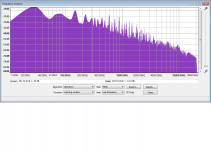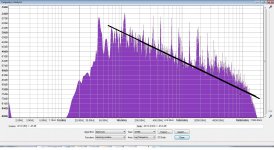Yeah, odd that Jay has been very quiet since he demonstrated he could get 8/8 right on a DBT using 2 bit identical files...
Mostly after I mentioned that my wife figured out how he was cheating. She's quite a bit better at IT than I am.
Kirchoff Test #3 has no takers because you had already admitted you post on this thread for sh*t and giggles, so why would you expect your flawed test to be taken seriously?
I just wonder how far people are willing to go to test the suitability of the blind test (in all aspects) to the task at hand & how many are just paying lip service to bias control?
Show of hands then - how many have participated in such a test - links please!
None with audio here. Several visual perception studies for colleagues (when a grad student, you're a test subject for one another!). Been poked and prodded for medical studies plenty. You learn a bunch about experimental procedures there. 🙂 Careful protocols are careful protocols.
Ah Hadn't seen you admit to the wife in the kitchen working it out 🙂
(for those who haven't read it https://linearaudio.net/article-detail/2110 is worth the money. Jan does make it free now and again, which is how I got my copy. It discusses the wife in the kitchen issue. It's funny as SY does most of the cooking).
(for those who haven't read it https://linearaudio.net/article-detail/2110 is worth the money. Jan does make it free now and again, which is how I got my copy. It discusses the wife in the kitchen issue. It's funny as SY does most of the cooking).
Kirchoff Test #3 has no takers because you had already admitted you post on this thread for sh*t and giggles, so why would you expect your flawed test to be taken seriously?
QED. BOTH camps will recur to dismissing a test as "flawed" when they feel they couldn't succeed at it.
I have though to admit that the T&M camp was honest in the sense that they didn't try to "win" through cheating.
No, your 'test' failed at the first step. It wasn't even trying to be a decent test. And you knew that when you proposed it, with an impish grin on your face!
No, your 'test' failed at the first step. It wasn't even trying to be a decent test. And you knew that when you proposed it, with an impish grin on your face!
What wasn't decent? The fact that you were allowed any measurement technique known to mankind? And unlimited time? All in the comfort of your own lab? 😕
It was broad, nebulous and handwavy without a clear testable premise. For example look at the two frequency plots shown for sections of classical recording. One is very clearly a less processed recording than the other, but it might not be enjoyable if you don't have speakers that can handle huge amounts of LF ambience information. There is a lot more you can work out with a bit of research and comparison with other recordings as well as how good I am at driving audacity!
For bonus points, which one of these is considered a 'legendary' recording?
For bonus points, which one of these is considered a 'legendary' recording?
Attachments
How about experiment nr. 4.
We agree on a CD track that is available in an original plus a re-mastered edition.
Then the T&M team tries to figure out which is "better" through measurements (and yes, they are allowed to listen, but only to one version).
The "subjectivist" team does the same just through listening. No peeking at waveforms or anything.
Then we compare results.
What do you think will happen?
We agree on a CD track that is available in an original plus a re-mastered edition.
Then the T&M team tries to figure out which is "better" through measurements (and yes, they are allowed to listen, but only to one version).
The "subjectivist" team does the same just through listening. No peeking at waveforms or anything.
Then we compare results.
What do you think will happen?
Experimental design is not your gift.
Mmmmmm the hive is buzzing again.... Bear, we must be close to the honey....
As SY said!
First problem is what are you trying to test? you seem to use 'better' and 'more enjoyable' interchangeably which is the first problem. Pick one and define it clearly then we just might have a starting point. Otherwise you still have the impish grin under you Halloween mask.
First problem is what are you trying to test? you seem to use 'better' and 'more enjoyable' interchangeably which is the first problem. Pick one and define it clearly then we just might have a starting point. Otherwise you still have the impish grin under you Halloween mask.
For a marvellous piece of not letting engineering get in the way of a good story.
The Musica Pristina Virtuoso Network DAC | AudioStream
It has the usual pile of buzzwords. tubes, tantalum resistors, dual mono (despite a single PCB for the audio stage). with this soundbite from the designer
I'd also love to see a tube that they can get repeatability on to not make that 100 hours a complete waste of their time. But hey $17k for something that shouldn't cost more than $500
The Musica Pristina Virtuoso Network DAC | AudioStream
It has the usual pile of buzzwords. tubes, tantalum resistors, dual mono (despite a single PCB for the audio stage). with this soundbite from the designer
They must do a correspondence course in audiophile BS, as its certainly not taught this way at uni...Voicing the circuit
Interestingly, we find that price and specifications don’t accurately determine which component will sound best in a given application. The technical design generates a list of potential components. Then, each of those is evaluated (by listening), and ultimately one is chosen. For example, six different types of resistors are used in the differential amplifier – each chosen for its performance in different parts of the circuit.
It doesn’t stop here. We spent over 100 hours selecting the operating point for the tubes—adjusting the current in small increments and listening for the best result. Once several “sweet spots” were found, we’d adjust the bias in small increments and listen again for the results. When the best bias points were found, we’d re-evaluate the previously selected current points.
I'd also love to see a tube that they can get repeatability on to not make that 100 hours a complete waste of their time. But hey $17k for something that shouldn't cost more than $500
A bit of a dichotomy here - people asking for others to do listening tests that they themselves haven't done! So what do we have as a result - one side, having heard differences, are told to do a bias-free blind listening test to prove it; the other side, who have not heard differences have not submitted themselves to the same bias-free blind listening test. Why would they? To perhaps check if the whole test (including themselves) is actually bias-free. Remember, a bias towards a null result also needs to be tested for.None with audio here. Several visual perception studies for colleagues (when a grad student, you're a test subject for one another!). Been poked and prodded for medical studies plenty. You learn a bunch about experimental procedures there. 🙂 Careful protocols are careful protocols.
A bit of a dichotomy here - people asking for others to do listening tests that they themselves haven't done!
Yeah, that "burden of proof" thing, it's almost as unpleasant as having to detect sonic differences without peeking. Unthinkable!
As SY said!
First problem is what are you trying to test? you seem to use 'better' and 'more enjoyable' interchangeably which is the first problem. Pick one and define it clearly then we just might have a starting point. Otherwise you still have the impish grin under you Halloween mask.
I am trying to give the T&M camp the opportunity to prove that they have (as they claim) a good model allowing them to predict subjective listening impressions - based on a list of numbers obtained through measurements.
If you don't like any of my proposed experiments, how about you propose one yourself?
I don't think you are. Subjective listening impressions have the whole brain involved so are affected by usual biases. Proof of this seen in the reviews in mags such as stereophile where the reviewer gushes over something that then measures pants.
Jumping from the 'I can hear the change from op-amp rolling' to I prefer this recording over that is a big leap. If the question was, 'can you tell which version is more compressed' then we might have a valid starting point. Peekers will still run it through audacity to cheat though..
Jumping from the 'I can hear the change from op-amp rolling' to I prefer this recording over that is a big leap. If the question was, 'can you tell which version is more compressed' then we might have a valid starting point. Peekers will still run it through audacity to cheat though..
I am trying to give the T&M camp the opportunity to prove that they have (as they claim) a good model allowing them to predict subjective listening impressions - based on a list of numbers obtained through measurements.
Since no one made that specific claim, you're not even out of the starting blocks before falling into error.
Yeah, that "burden of proof" thing, it's almost as unpleasant as having to detect sonic differences without peeking. Unthinkable!
Ah well I consider this "burden of proof" just a debating tactic when those asking for such formally robust tests know that there is little chance of participating in one. A show of hands of those who have done such formal blind tests will reveal whether it is realistic a request or not.
Ah well I consider this "burden of proof" just a debating tactic when those asking for such formally robust tests know that there is little chance of participating in one. A show of hands of those who have done such formal blind tests will reveal whether it is realistic a request or not.
Extraordinary claims require extraordinary evidence. Only one group of people here are claiming to be able to hear nearly or completely unmeasurable artifacts.
- Status
- Not open for further replies.
- Home
- General Interest
- Everything Else
- What is wrong with op-amps?

